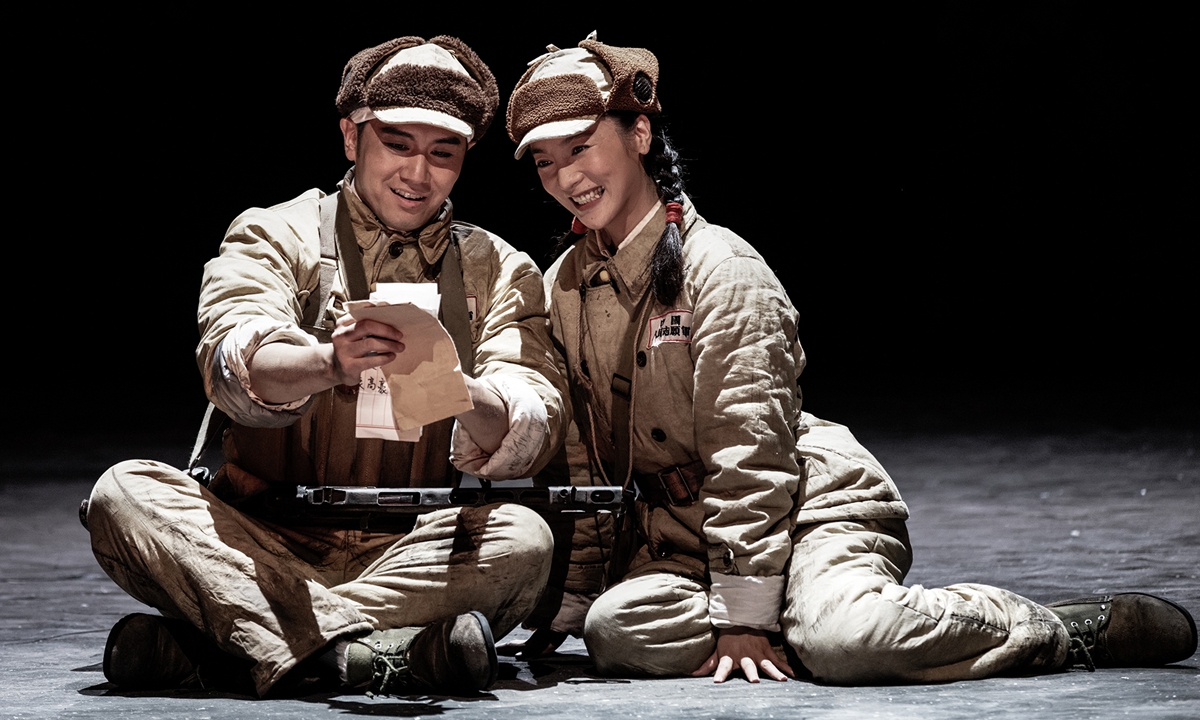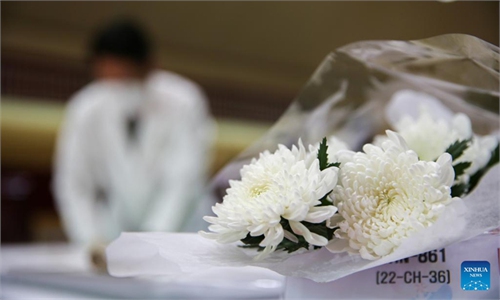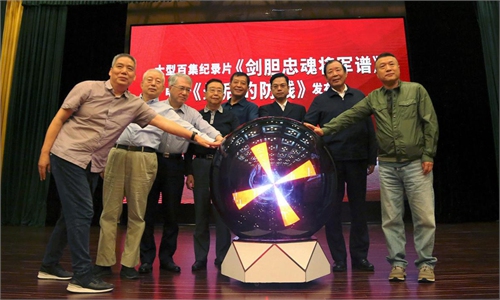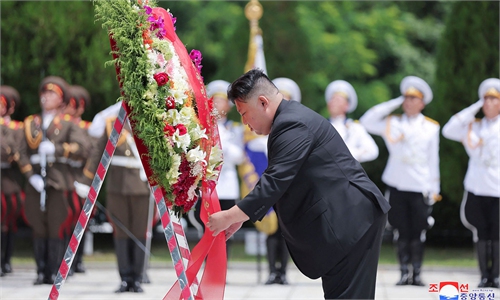ARTS / CULTURE & LEISURE
Various artworks released to mark Korean War Armistice anniversary

Promotional material for Heroic Sons and Daughters Photo: Courtesy of Shanghai Dramatic Arts Center
For 66-year-old veteran actor Fu Chong, his dream since childhood will come true as the drama version of the Chinese war epic Heroic Sons and Daughters in which he starred is staged at the National Centre for the Performing Arts on Thursday.
The war epic moved the then-youngster Fu to tears many times due to the brave spirit and patriotism of the Chinese People's Volunteers (CPV) soldiers in the movie during the War to Resist US Aggression and Aid Korea (1950-53), which is also known as the Korean War.
"After so many years, I, standing on the stage, still can feel their spirit and courage as they fought against the enemy, guard our motherland and secure our peaceful life for the past 70 years," Fu told the Global Times on Wednesday.
Thursday marks the 70th anniversary of the Korean War Armistice. A series of cultural works, including documentaries and dramas, have been released.
From documentary to stage works
On October 19, 1950, as requested by North Korea, the CPV army crossed the Yalu River on the border between China and North Korea to aid the latter's fight against US aggression until an armistice was signed in 1953.
Among the recent commemorating works, a five-episode documentary series titled From Kaesong to Panmunjom is being aired on Beijing TV, and will run from Monday to Friday. The documentary reviewed the 749-day Korean War Armistice negotiations, an unprecedented "marathon" with 733 meetings, and disclosed the behind-the-scenes struggle mainly between China and the US.
Another prominent work, the drama Heroic Sons and Daughters, depicts the valiant contributions of Chinese soldiers, particularly focusing on the story of siblings from an ordinary family who fought bravely in the war, with the elder brother sacrificing his life heroically.
"As we celebrate and praise these heroes, it's not just to remember their deeds but also to promote the heroic spirit and draw strength from their examples for a better life and learning," Yu Rongjun, the playwright of the drama, told the Global Times.

Promotional material for Heroic Sons and Daughters Photo: Courtesy of Shanghai Dramatic Arts Center
A family's contribution to the warTwo 6-meter-high paper fragments symbolized the connection between the frontline and the home front, along with multiple sets shifting between battlefield scenes. More than 10 actors, dressed in uniform, shuttle through trenches, military headquarter and hospitals amid the intense flames of war.
The play draws inspiration from the novel Reunion by Chinese writer Ba Jin and the eponymous film produced by Changchun Film Studio in 1964. As it is reenacted on the stage, the story accentuates the depiction and portrayal of war scenes. The use of realistic stage settings vividly conveys the image of the war to the audience.
One of the actors named Liu Xuanrui, who portrayed the character of Wang Cheng sacrificing his life heroically during the war, noted it is the bravery of the soldiers in the war that paved the way for 70 years of peace and prosperity, offering the current generation the life they enjoy today.
The play's lead actress, Mai Duo, who played the role of Wang Fang following his brother's steps to join the battle, also sang the theme song "Ode to the Heroes," one of the most well-known songs in China.
"I hope that young audiences could still feel the powerful spirit of patriotism and carry it forward," she told the Global Times.
Fu expressed his views on how young people express love for their country in times of peace, "I believe that as individuals and members of a nation, everyone can always contribute their share to this country. No matter what you do, even if it means simply doing your own job well, it is a way of contributing to the nation."
The sacrifices made by tens of thousands of Chinese soldiers finally lead to the armistice agreement that marked the victory of the War to Resist US Aggression and Aid Korea.
Hard negotiations
Seventy years ago, the CPV and the Korean People's Army fought against the US army. Meanwhile, negotiations were going on from July 10, 1951 till July 27, 1953.
However, the US tried every possible way to obstruct the talks and imposed military pressure on the Chinese and Korean sides, such as bombing the venue in Kaesong, attacking the CPV and Korean People's Army troops, and cutting off their supplies. Under their pressure, the venue was later shifted to Panmunjom. Upholding the position of justice, China and North Korea made a tit-for-tat fight on the negotiation table against the US.
According to the report on bjnews.com.cn, the film reveals patriotism, bravery, tenacity, loyalty, heroism and optimism as well as the internationalist spirit of the CPV for safeguarding Chinese national dignity, fulfilling the lofty mission entrusted by their motherland and people, and maintaining peace and justice of the humanity.
Zhou Xueying, professor at Nanjing University, told the Global Times, "The armistice negotiations marked the great victory of the Chinese and Korean people in the war. They also proved that negotiations are better than war. Peace is precious."
Zhang Yiwu, a professor at Peking University, told the Global Times, "The documentary was well-done as it showcases many historical moments which are rarely seen based on both domestic and international backgrounds, and made an in-depth analysis of the whole process of armistice negotiations, which is valuable." "The film depicted every aspect of the negotiations and connected them to the concurrent war with its emphasis on the pivotal role of negotiations played as in other important wars in the world," said Zhang.
He also made a particular mention of the perspective of armistice negotiations the film took in de-scribing the war. "Most previous movies about the war focused on the battleground, but this one was very different as it featured the negotiations too."
The documentary has fully revived the more than two-year hard negotiations and reached a consensus that was acceptable to both sides. It is "very inspiring and really worth remembering," said Zhang.




